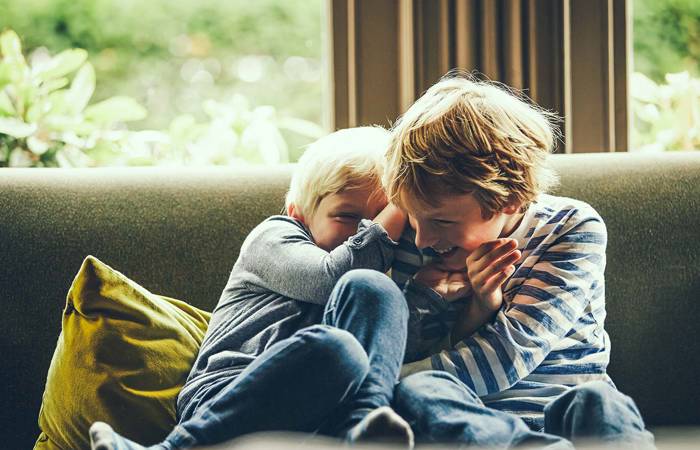Like what you see?
Sign up to receive more free parenting advice.
Thank you for subscribing to our newsletter!
Child Development

Credit: iStock.com/Mladen Zivkovic
Many parents see sibling rivalry as just another part of family life and that their children will eventually grow out of the behaviour. But for others, it can be an incredibly challenging time not knowing how to handle sibling arguments or fights that may get out of control.
What causes sibling rivalry?
Sibling rivalry is often about gender, position order, stage and age of development. According to child psychologist Dr Fiona Martin, for children with a large age gap, the rivalry is virtually non-existent due to the children being at different stages of development.
There is a greater chance of sibling conflict when children are twins or if they’re close together in age.
“If they’re closer to the same age that’s when you see children competing for the same objects or for attention. They’re learning about the world at the same time or, if they’re twins, they know what to do to set each other off,” Dr Martin says.
“Boys are more likely to engage in sibling conflict which tends to be physical, particularly after a testosterone surge. Whilst I like to call it ‘rumbling’ or ‘cub play’ it can get out of hand. So gender does play a role as well as age and stage development. Particularly if one sibling is more mentally or socially advanced than the other.”
Parents needs to foster positive play, which can also involve rewarding sharing and also rewarding periods of non-fighting. Always make sure the children are rewarded as a team.Dr Fiona Martin
Stay up to date with the latest news and articles from First Five Years
Thank you for subscribing to our newsletter!
How to stop sibling rivalry
Dr Martin believes the most effective way for parents to cope with sibling rivalry is all about ‘positive play.’ This means putting a big focus on sharing, as well as taking turns.
“Parents needs to foster positive play, which can also involve rewarding sharing and also rewarding periods of non-fighting. Always make sure the children are rewarded as a team. I think it’s important parents spend time with each child as individuals as much as a pair. Reward them for telling you about nice shared experiences they’ve been involved in,” Dr Martin says.
“It’s all about dealing with the rivalry effectively. So the focus should not be on listening to ‘tell taling’. It’s important to coach from the sideline as much as possible rather than dealing with the conflict yourself because you want the kids to learn conflict resolution skills, as that’s very beneficial in the long term.”
If the arguing is getting out of hand, Dr Martin believes it’s a good idea to apply the blame equally, rather than focusing on one child as being the main instigator.
“When you realise you need to step in and stop the arguments, make sure both children get consequences or punishments otherwise you risk escalating the situation. Don’t blame just one child and make sure the punishment is equal. If the punishment involves taking a toy away from the child, make sure you separate the children for a brief period and remove the object of the argument,” Dr Martin says.
What NOT to do when siblings fight
Dr Martin encourages parents not to find out who started the argument in the first place as that will just make things worse.
“There’s no point finding out who started it because they both have a role to play in the argument and conflict. So I think trying to attribute blame is very difficult so treating them equally is the best way forward.”
“Separating the kids briefly will help calm them down and allows them to do a bit of reflecting. Then you could talk to them and give them the opportunity to solve the problem themselves. Ask them questions, get them to brainstorm and come up with solutions.
If the fighting gets to a stage where parent intervention is needed, Dr Martin says there’s a difference between coaching and refereeing.
“I don’t think parents should referee, but I think coaching is quite acceptable because coaching reminds the children about strategies, that they’ve learnt or discussed before. Or coaching can be about asking open ended questions, such as, ‘How are we going to resolve this?’ And, ‘Have you got any ideas how to resolve this? What do you think we can do to make this better?’ I think parents can coach when they start to hear things escalate and there’s a risk of somebody being hurt,” Dr Martin says.
“That’s when it’s necessary to separate the children but parents must be mindful about being proactive in their own behaviour management rather than being reactive. A lot of sibling conflict is reactive, rather than proactive (which is about fostering positive play). So find positive behaviour you can reward like co-operation and sharing, and reward them for that positive behaviour.”
If your child has been enjoying the peace that comes with being an only child and you’ve recently broken the news, ‘You’re going to be a big sister/brother!’ then you should brace yourself for changes you might not have thought about.
How to prepare a child for a new sibling
When it comes to preparing a child for a new sibling, there are several practical ways to go about it, so the child doesn’t feel upset or anxious. Dr Martin suggests providing the child with stories about welcoming a new baby into the home.
“There are many picture books widely available that deal with the issue and it would help if you regularly read a book about having a baby or what it’s like to be a big brother or sister. This will help the child get used to the idea of having a new baby in the house.
“Another idea is to take your child to visit friends who have a baby – it’s a way of desensitising them to babies so that it doesn’t seem like a scary concept to have a new brother or sister. Parents could also take their child to hospital visits or doctor’s appointment so they can see the scan of their new sibling. Make sure you talk about the new baby as much as possible and what all the fun things the baby and sibling can do together.”
Preparing for or managing sibling conflict
- Prepare your child for a new baby: reading books together about babies and welcoming them to the home. Also visiting friends with babies and having your child come to doctor’s appointments where they can see a scan of their new brother or sister.
- Foster positive play: encourage sharing and taking turns
- Reward sharing or co-operating and playing peacefully
- Don’t blame one child over the other when they start to fight or argue
- Share blame equally and punish equally, i.e. take the object of the argument away from the children.
- Make sure you ‘coach’ the children and not ‘referee.’ Remind the children about things they’ve already discussed with you and ask them open ended questions.






